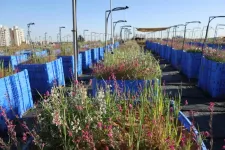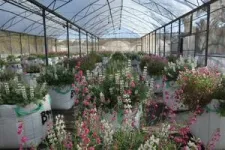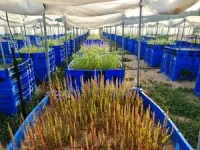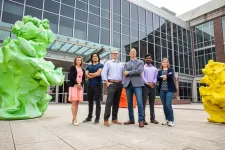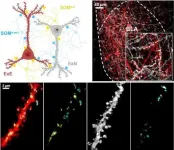(Press-News.org) The study is based on a new database created by the researchers which combines, for the first time, datasets on distribution and datasets on lifecycles, making it possible to establish the prevalence of different lifecycles around the globe. It uses empirical tools and big data to examine theoretical paradigms about the way in which human disturbance is affecting annual plants and their global distribution. Among other things, it was found that annuals are expected to benefit more with the rise in human population density and due to climate change, which could prove devastating for the ecosystem.
[Jerusalem, Israel] A new study published in the journal Nature examines, for the first time, the lifecycles of plants on a global scale, via the creation of a unique database containing huge quantities of data. The study was led by Dr. Niv DeMalach of the Robert H. Smith Faculty of Agriculture, Food and Environment at the Hebrew University of Jerusalem; Prof. Itay Mayrose of the George S. Wise Faculty of Life Sciences at Tel Aviv University; and Dr. Tyler Poppenwimer, formerly a post-doctoral student at the Hebrew University and Tel Aviv University and now a researcher at the FDA.
Prior to the current study, the use of empirical data to assess the spread of vegetation was restricted to localized studies of regional systems. The new database brings together in one place, for the first time, data about the lifecycles of some 235,000 species (67% of the species known to science), which were collected over the last 80 years from various sources throughout the world, including millions of observations of species across the globe.
For decades, scientists have been interested in the factors influencing the distribution and lifecycles of perennial and annual plant life, and the competition between the two, in an effort to understand the laws of nature and the adaptation of different species to environmental conditions. Various mathematical models have been developed to describe the conditions that affect perennials and annuals. This new study by Dr. DeMalach and Prof. Mayrose, and the international database they have created, marks the first attempt to examine the relationship between those models and the real-world situation.
Plant species can be differentiated into perennials (plants that usually live for longer than a year) and annuals (plants that complete their lifecycle within a single growing season, and die after producing seeds). The large majority of species in nature are perennials, as this category includes grasses as well as trees and bushes, and they are very important for the ecosystem as a whole due to their central role in moderating climate changes throughout that system and preventing soil erosion and flooding.
Among agricultural crops the numbers are reversed, with annuals taking up around 70% of agricultural lands and constituting some 80% of the foods consumed by humans. This is because annuals are more efficient at producing seeds, which are a source of carbohydrates and proteins and form the backbone of the human diet.
The researchers found that annuals are common in regions in which summers are marked by particularly high temperatures and low rainfall. This contrasts with the previously accepted view, which did not consider the seasons of the year to be a relevant parameter and instead focused solely on annual averages of temperature and precipitation. For example, the proportion of annuals is higher in California compared with the Chihuahuan desert despite the latter being more arid on average. This is because the summers in California are much drier (almost no summer rain). Additionally, the study found a much lower distribution of annuals throughout the world than was previously thought to be the case. While the accepted estimate in the scientific community was that they form around 12% of all vegetation, the new study findings show a figure less that half that, at no more than 6%.
As part of the study, the researchers created a new and unique global database, which makes it possible to predict the future impact of climate change on the plant world. Among other things, the researchers confirmed the hypothesis that annuals are expected to become more common more as the human footprint on the environment becomes larger. In addition, they developed a model suggesting that within three decades, the proportion of annuals will increase in some 70% of regions around the globe. This is likely to harm the environment, as (for example) annuals are less efficient than perennials at reducing carbon dioxide in the atmosphere.
Dr. DeMalach, of the Robert H. Smith Faculty of Agriculture, Food and Environment at the Hebrew University of Jerusalem, explained the importance of the findings: “The study both helps explain human history and is relevant for the future of humankind. It helps us understand why agriculture, which is the basis for human civilization, first appeared in the Middle East. Our region is unusual in its high proportion of annuals, and now we know why—it has the right climate conditions. Food production is based mainly on annual species. This is true today, and it was true thousands of years ago. These conditions facilitated the transition from a hunter-gatherer society to an agricultural society. Regarding the future, our model suggests that the human species has become the most influential factor on the planet, and not only will its impact have consequences for wild plant life, but the changes caused will also affect human life in turn.”
Regarding the importance of the factors affecting the spread of annuals, Dr. DeMalach noted: “One of the great challenges facing humanity in the 21st century is providing food for billions of people with minimal damage to the environment. Therefore, extensive efforts are being made to shift from annual crops to perennial crops, which are more environmentally friendly.” Dr. DeMalach continued: “The problem today is that perennial crops are still less productive, and there is great debate as to whether they can be made more productive in the future.”
Disclaimer: In these challenging times of war and crisis, Hebrew University of Jerusalem is resolute in its dedication to advancing research and education. We stand in full support of the brave individuals on the frontlines, safeguarding our nation and the well-being of all Israelis, and extend our deepest gratitude and unwavering solidarity to our community and fellow citizens. Together, we shall prevail against the challenges that confront us, and our shared commitment to the well-being of all Israelis and the pursuit of knowledge remains resolute.
END
Plant lifecycle insights: Big data can predict climate change impact
A new study published in Nature offers a paradigm shift regarding lifecycles in the plant world, and uses big data to predict the future impact of climate change
2023-11-08
ELSE PRESS RELEASES FROM THIS DATE:
Scientists one step closer to re-writing world’s first synthetic yeast genome, unravelling the fundamental building blocks of life
2023-11-08
Scientists have engineered a chromosome entirely from scratch that will contribute to the production of the world’s first synthetic yeast.
Researchers in the Manchester Institute of Biotechnology (MIB) at The University of Manchester have created the tRNA Neochromosome – a chromosome that is new to nature.
It forms part of a wider project (Sc2.0) that has now successfully synthesised all 16 native chromosomes in Saccharomyces cerevisiae, common baker’s yeast, and aims to combine ...
Scientists take major step towards completing the world’s first synthetic yeast.
2023-11-08
A UK-based team of Scientists, led by experts from the University of Nottingham and Imperial College London, have completed construction of a synthetic chromosome as part of a major international project to build the world’s first synthetic yeast genome.
The work, which is published in Cell Genomics, represents completion of one of the 16 chromosomes of the yeast genome by the UK team, which is part of the biggest project ever in synthetic biology; the international synthetic yeast genome collaboration.
The collaboration, known as 'Sc2.0' has been a 15-year project involving teams from around the world (UK, US, China, Singapore, UK, France and Australia), working together ...
New antifungal molecule kills fungi without toxicity in human cells, mice
2023-11-08
CHAMPAIGN, Ill. — A new antifungal molecule, devised by tweaking the structure of prominent antifungal drug Amphotericin B, has the potential to harness the drug’s power against fungal infections while doing away with its toxicity, researchers at the University of Illinois Urbana-Champaign and collaborators at the University of Wisconsin-Madison report in the journal Nature.
Amphotericin B, a naturally occurring small molecule produced by bacteria, is a drug used as a last resort to treat fungal infections. While AmB excels at killing fungi, it is reserved ...
Cellular “atlas” built to guide precision medicine treatment of rheumatoid arthritis
2023-11-08
Research consortium investigators analyzed over 314,000 cells from rheumatoid arthritis tissue, defining six types of inflammation involving diverse cell types and disease pathways
Understanding the disease at single-cell level may advance targeted drug development and treatment strategies
Rheumatoid arthritis (RA) is an autoimmune disease characterized by inflammation that leads to pain, joint damage, and disability, which affects approximately 18 million people worldwide. While RA therapies targeted to specific inflammatory pathways have emerged, only some patients’ symptoms improve with treatment, emphasizing the need for multiple ...
Estimated effectiveness of co-administration of the Pfizer-BioNTech COVID-19 vaccine with influenza vaccine
2023-11-08
About The Study: In this study that included 3.4 million adults, co-administration of the BNT162b2 BA.4/5 bivalent mRNA COVID-19 vaccine (Pfizer-BioNTech) and seasonal influenza vaccine was associated with generally similar effectiveness in the community setting against COVID-19–related and seasonal influenza vaccine-related outcomes compared with giving each vaccine alone and may help improve uptake of both vaccines.
Authors: Leah J. McGrath, Ph.D., of Pfizer Inc., in New York, is the corresponding author.
To ...
Age at diagnosis of atrial fibrillation and incident dementia
2023-11-08
About The Study: Earlier onset of atrial fibrillation was associated with an elevated risk of subsequent all-cause dementia, Alzheimer disease, and vascular dementia in this study including 433,000 UK Biobank participants, highlighting the importance of monitoring cognitive function among patients with atrial fibrillation, especially those younger than 65 years at diagnosis.
Authors: Fanfan Zheng, Ph.D., of the Chinese Academy of Medical Sciences & Peking Union Medical College in Beijing, and Wuxiang Xie, Ph.D., of the Peking University First ...
Physicists trap electrons in a 3D crystal for the first time
2023-11-08
Electrons move through a conducting material like commuters at the height of Manhattan rush hour. The charged particles may jostle and bump against each other, but for the most part they’re unconcerned with other electrons as they hurtle forward, each with their own energy.
But when a material’s electrons are trapped together, they can settle into the exact same energy state and start to behave as one. This collective, zombie-like state is what’s known in physics as an electronic “flat band,” and scientists predict that when electrons are in this state they can start to ...
Scaling up nano for sustainable manufacturing
2023-11-08
A new self-assembling nanosheet could radically accelerate the development of functional and sustainable nanomaterials for electronics, energy storage, health and safety, and more.
Developed by a team led by Lawrence Berkeley National Laboratory (Berkeley Lab), the new self-assembling nanosheet could significantly extend the shelf life of consumer products. And because the new material is recyclable, it could also enable a sustainable manufacturing approach that keeps single-use packaging and electronics out of landfills.
The ...
Validating the role of inhibitory interneurons in memory
2023-11-08
Memory, a fundamental tool for our survival, is closely linked with how we encode, recall, and respond to external stimuli. Over the past decade, extensive research has focused on memory-encoding cells, known as engram cells, and their synaptic connections. Most of this research has centered on excitatory neurons and the neurotransmitter glutamate, emphasizing their interaction between specific brain regions.
To expand the understanding of memory, a research team led by KAANG Bong-Kiun (Seoul National University, Institute ...
Scientists tame biological trigger of deadly Huntington’s disease
2023-11-08
Huntington’s disease causes involuntary movements and dementia, has no cure, and is fatal. For the first time, UC Riverside scientists have shown they can slow its progression in flies and worms, opening the door to human treatments.
Key to understanding these advancements is the way that genetic information in cells is converted from DNA into RNA, and then into proteins. DNA is composed of chemicals called nucleotides: adenine (A), thymine (T), guanine (G), and cytosine (C). The order of these nucleotides determines what biological instructions are contained in a strand of DNA.
On occasion, some DNA nucleotides repeat themselves, ...
LAST 30 PRESS RELEASES:
Novel camel antimicrobial peptides show promise against drug-resistant bacteria
Scientists discover why we know when to stop scratching an itch
A hidden reason inner ear cells die – and what it means for preventing hearing loss
Researchers discover how tuberculosis bacteria use a “stealth” mechanism to evade the immune system
New microscopy technique lets scientists see cells in unprecedented detail and color
Sometimes less is more: Scientists rethink how to pack medicine into tiny delivery capsules
Scientists build low-cost microscope to study living cells in zero gravity
The Biophysical Journal names Denis V. Titov the 2025 Paper of the Year-Early Career Investigator awardee
Scientists show how your body senses cold—and why menthol feels cool
Scientists deliver new molecule for getting DNA into cells
Study reveals insights about brain regions linked to OCD, informing potential treatments
Does ocean saltiness influence El Niño?
2026 Young Investigators: ONR celebrates new talent tackling warfighter challenges
Genetics help explain who gets the ‘telltale tingle’ from music, art and literature
Many Americans misunderstand medical aid in dying laws
Researchers publish landmark infectious disease study in ‘Science’
New NSF award supports innovative role-playing game approach to strengthening research security in academia
Kumar named to ACMA Emerging Leaders Program for 2026
AI language models could transform aquatic environmental risk assessment
New isotope tools reveal hidden pathways reshaping the global nitrogen cycle
Study reveals how antibiotic structure controls removal from water using biochar
Why chronic pain lasts longer in women: Immune cells offer clues
Toxic exposure creates epigenetic disease risk over 20 generations
More time spent on social media linked to steroid use intentions among boys and men
New study suggests a “kick it while it’s down” approach to cancer treatment could improve cure rates
Milken Institute, Ann Theodore Foundation launch new grant to support clinical trial for potential sarcoidosis treatment
New strategies boost effectiveness of CAR-NK therapy against cancer
Study: Adolescent cannabis use linked to doubling risk of psychotic and bipolar disorders
Invisible harms: drug-related deaths spike after hurricanes and tropical storms
Adolescent cannabis use and risk of psychotic, bipolar, depressive, and anxiety disorders
[Press-News.org] Plant lifecycle insights: Big data can predict climate change impactA new study published in Nature offers a paradigm shift regarding lifecycles in the plant world, and uses big data to predict the future impact of climate change
